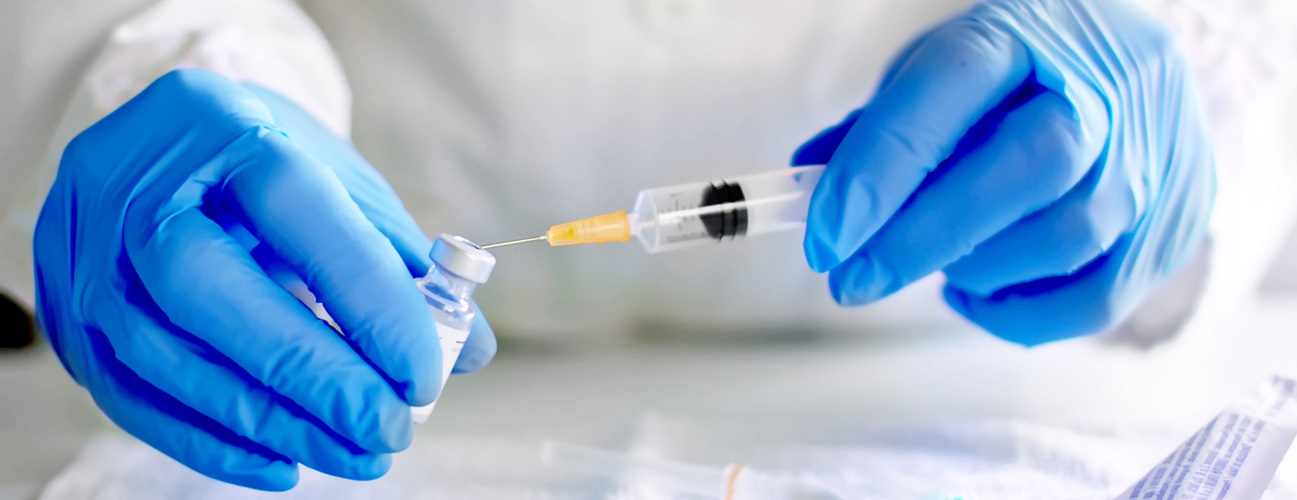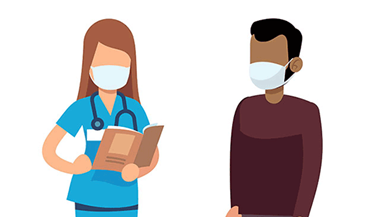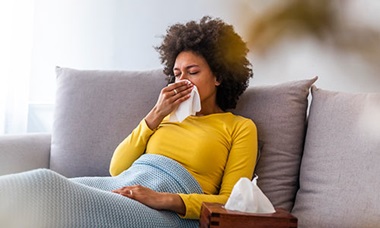COVID-19 Vaccine: What You Need to Know
Featured Experts:
The U.S. Food and Drug Administration (FDA) has approved use of vaccines for the coronavirus that causes COVID-19. Lisa Maragakis, M.D., M.P.H., senior director of infection prevention, and Gabor Kelen, M.D., director of Johns Hopkins Office of Critical Event Preparedness and Response, address common questions and explain how a vaccine could affect the current pandemic.
Learn more about:
- COVID-19 Vaccines and How They Work
- Getting the Vaccine
- Protection and Immunity
- Vaccine Safety and Side Effects
- Women and Children
COVID-19 Vaccines and How They Work
How do vaccines work?
Vaccines help people develop immunity to a virus or other germ. A vaccine introduces a less harmful part of that germ — or something created to look or behave like it — into a person’s body. The body’s immune system develops antibodies that fight that particular germ and keep the person from getting sick from it. Later, if the person encounters that germ again, their immune system can “recognize” it and “remember” how to fight it off.
Is there a vaccine for the coronavirus disease?
Yes, there are several COVID-19 vaccines recommended by the CDC. It is also important to receive a booster when you are eligible.
How will a vaccine prevent COVID-19?
The coronavirus that causes COVID-19 has spikes of protein on each viral particle. These spikes help the viruses attach to cells and cause disease. Some of the coronavirus vaccines are designed to help the body “recognize” these spike proteins and fight the coronavirus that has them.
An effective vaccine helps protect the person who receives it from serious illness, hospitalization and death. Widespread vaccination will help limit spread through communities and will restrict the virus’s opportunity to continue to mutate into new variants.
When can I get the coronavirus vaccine?
Vaccines and boosters are being distributed across the United States.
If you are a Johns Hopkins Medicine patient, visit our COVID-19 Vaccine Information and Updates page for current information on getting vaccinated or receiving a booster. Your state’s health department website can also provide updates on vaccine distribution in your area.
Getting the Vaccine
The U.S. Food and Drug Administration (FDA) authorized, and the Centers for Disease Control and Prevention (CDC) now recommend, COVID-19 vaccines for everyone 6 months and older, and boosters for everyone 5 and older. Individuals are up to date on vaccines and boosters after receiving all doses in the primary series and all boosters recommended, when eligible.
Vaccines: Individuals 6 months and older are fully vaccinated 2 weeks after the final dose in the primary series.
- Vaccine recommendations are different depending on your age, the vaccine you first received, and time since last dose. For details, please review the CDC’s COVID-19 vaccine recommendations.
- COVID-19 vaccine recommendations for people who are moderately or severely immunocompromised include an additional dose in their primary series. For details, please review the CDC’s COVID-19 vaccine recommendations for those who are moderately or severely immunocompromised.
Boosters
1 booster: The CDC recommends everyone 5 and older get a booster when eligible. Please review the CDC’s booster guidelines for details. (Timelines will vary for those who are immunocompromised.)
2 boosters: The CDC recommends a second booster for the following groups:
- Adults 50 and older
- Those 12 and older who are moderately or severely immunocompromised. Please review the CDC’s booster guidelines for details.
Bivalent Booster
As of Oct. 12, 2023, the new COVID-19 booster recommendations for people ages 5 years and older is to receive 1 bivalent mRNA booster after completion of a monovalent primary series or previously received monovalent booster dose(s); these recommendations replace all prior booster recommendations for this age group.
- Recommendations for use of a bivalent Moderna booster dose in people ages 6–17 years
- Recommendations for use of a bivalent Pfizer-BioNTech booster dose in people ages 5–11 years
The CDC recommends a bivalent (containing components of both the original strain of the SARS-CoV-2 virus and the omicron variant of the virus) COVID-19 booster for people ages 5 years and older. The bivalent vaccines, which offer better protection against COVID-19 caused by the omicron variant than the earlier, monovalent vaccines, have been authorized for use as a single booster dose administered at least two months after primary or booster vaccination. The monovalent COVID-19 vaccines will no longer be available for booster doses in patients over the age of 5. However, the monovalent vaccines will remain available for the primary vaccine series in all patients and for booster doses in patients younger than 5 years old.
Visit the CDC’s COVID-19 vaccine and booster page for more details.
Should I get a COVID-19 vaccine if I already had COVID-19?
Yes, evidence continues to indicate that getting a COVID-19 vaccine is the best protection against getting COVID-19, whether you have already had COVID-19 or not.
- A study published in August 2021 indicates that if you had COVID-19 before and are not vaccinated, your risk of getting reinfected is more than two times higher than for those who were infected and got vaccinated.
- While evidence suggests there is some level of immunity for those who previously had COVID, it is not known how long you are protected from getting COVID-19 again. Plus, the level of immunity provided by the vaccines after having COVID-19 is higher than the level of immunity for those who had COVID but were not subsequently vaccinated.
- Getting vaccinated provides greater protection to others since the vaccine helps reduce the spread of COVID-19.
At the time of vaccination, be sure to tell your care provider about your history of COVID-19 illness, including the kind of treatment, if any, you received and when you recovered. Wait until your isolation period ends before making an appointment to get the vaccination.
Protection and Immunity
If I get a coronavirus vaccination, do I still have to wear a mask? Physical distance?
The CDC continues to monitor the spread of COVID-19 and makes recommendations for wearing face masks, both for those who are fully vaccinated as well as those who are not fully vaccinated.
The CDC also recommends that masks and physical distancing are required when going to the doctor’s office, hospitals or long-term care facilities, including all Johns Hopkins hospitals, care centers and offices.
Johns Hopkins Medicine’s current mask safety guidelines have not changed, and we still require all individuals to wear masks inside all of our facilities.
Does taking over-the-counter medications before receiving the vaccine lessen its effectiveness?
Some studies have suggested that taking medications such as Tylenol or Advil before getting a vaccination might reduce your body’s ability to mount an immune response to the vaccine. It’s unclear if these findings have any clinical significance, though, and other studies did not find any effect of anti-inflammatory medications on the immune reaction to vaccines.
If you regularly take aspirin or other over-the-counter medications such as acetaminophen (e.g., Tylenol), ibuprofen (e.g., Motrin, Advil) or naproxen (e.g., Aleve) for other medical conditions, please continue to do so as directed by your physician or as needed. Otherwise, it’s probably best to not take over-the-counter medications such as acetaminophen or ibuprofen that reduce fever or inflammation before receiving a vaccine. If you are uncomfortable or have symptoms after vaccination, that is the time to take an over-the-counter medication to help you feel better.
Vaccine Safety and Side Effects
How will we know if a COVID-19 vaccine is safe and effective?
In order to be declared safe and effective, a COVID-19 vaccine must pass certain tests and standards. Organizations such as the National Academy of Sciences, the National Institutes for Health, and the Food and Drug Administration (FDA) use scientific data from research to help decide if and when new drugs and vaccines can become available to the public. It is important to note that you cannot get COVID-19 from a vaccine. The vaccines contain proteins or other biological substances to stimulate the immune response, but not the coronavirus itself.
Learn more about the safety of the COVID-19 vaccines.
What are the coronavirus vaccine side effects?
You may have pain in the arm where you got the shot, and you might run a fever and experience body aches, headaches and tiredness for a day or two. Chills, swollen lymph nodes can also occur.
Read more about possible COVID-19 vaccine side effects.
Is it OK to get the COVID-19 vaccine if I have allergies?
While there have been reports of severe allergic-type reactions in a very small number of patients, the CDC says that people with allergies to certain foods, drugs, insects, latex and other common allergens can still get the COVID-19 vaccine.
If you have had a severe allergic reaction (anaphylaxis) to injectables or other vaccines, be sure to discuss the COVID-19 vaccination with your doctor, who can evaluate you and assess your risk. The vaccine provider should observe you for 30 minutes rather than the routine 15 minutes after vaccination, and if you have an allergic reaction to the first shot, you may not receive the second.
The CDC says that at this time, anyone who has a severe allergy (such as anaphylaxis) to any of the vaccine ingredients should not get that vaccine.
Women and Children
Can children receive a COVID-19 vaccine?
The U.S. Food and Drug Administration (FDA) authorized and the Centers for Disease Control and Prevention (CDC) now recommends COVID-19 vaccines for everyone 6 months and older, and boosters for everyone 5 and older. Johns Hopkins Medicine encourages all families to have eligible children vaccinated with the COVID-19 vaccine.
Read more about what parents need to know about the COVID-19 vaccine.






